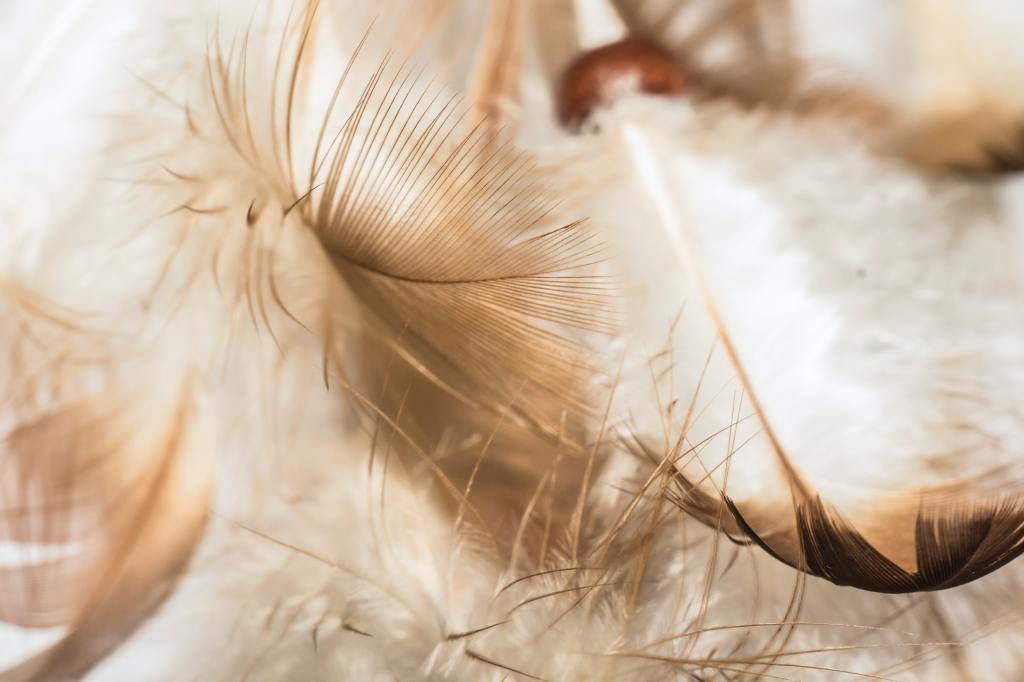What does that make you think of?
There are hints and guesses in the Torah (the first five books of the Hebrew Scriptures). The Spirit is said to “hover” over the waters before creation, a word which evokes a nurturing mother bird and therefore wings. In Exodus God says that he took Israel on eagle’s wings and bore them out of Egypt. Then there are the outstretched wings of the cherubim above the mercy seat, where space was made for both God and Israel to meet.
But never are the wings of God referred to in a personal blessing, until Boaz says to Ruth, “May you be richly rewarded by the LORD, the God of Israel, under whose wings you have come to take refuge.”
There is a visual theme winking at you here: Rahab the prostitute hides the two spies by covering them with the flax drying on her roof. Salmon, who Rahab marries, has a name that means “garment”—and covering another with your cloak is a way to speak of marriage in other places in the Old Testament. And so Boaz, the son of Rahab and Salmon, says that Ruth has come to take refuge under the wings of God. When Naomi tells Ruth to go to the winnowing floor at night, uncover Boaz’s feet, and wait (“He will tell you what to do”, Naomi says), Ruth goes. And when Boaz wakes up and asks who is lying at his feet, Ruth tells him what to do: “I’m your handmaid Ruth. Spread your wings over your handmaid, because you are a redeeming kinsman.”
So we have the wings again. What I find beautiful is that Ruth’s great-grandson David would live and breathe the metaphor of God’s wings. Did he ever meet Ruth and Boaz? I don’t know. But he would have had their story told to him again and again, regardless.
And he took that story that multiplies the word chesed, steadfast love, and he wove chesed into many of his songs. The image and the comfort of God’s wings, and the concern of God for the fatherless, the widows, the poor, and the hungry, are evident in the Psalms of David.
Here are a few examples:
You know Psalm 91: “He will cover you with his feathers, and under his wings you will find refuge; his faithfulness will be your shield and rampart.”
Psalm 63, “Because you are my help, I sing in the shadow of your wings. I cling to you; your right hand upholds me.” (Do you recognize the language of Ruth “clinging to” Naomi?)
Psalm 61, “For you have been my refuge, a strong tower against the foe. I long to dwell in your tent forever and take refuge in the shelter of your wings.”
Psalm 17, “Keep me as the apple of your eye; hide me in the shadow of your wings from the wicked who are out to destroy me, from my mortal enemies who surround me.”
Psalm 57, “Have mercy on me, my God, have mercy on me, for in you I take refuge. I will take refuge in the shadow of your wings until the disaster has passed.”
Psalm 36, “How priceless is your unfailing love, O God! People take refuge in the shadow of your wings. They feast on the abundance of your house; you give them drink from your river of delights.”
The danger David faced, running for his life from Saul (Psalm 57 was composed as he hid in a cave) was not the same danger that Ruth faced, going out to forage for food in a situation that could easily end with her assaulted or, at best, verbally abused. (Two risks the story acknowledges.) But I like to think that
“the wings of God” brought to mind for David mental images of his great-grandparents, of Ruth. In turn, these psalms have become a lifeline and a comfort to many who find themselves in situations of danger, emptiness, grief, and darkness.
It is just one more way that the stories intertwine and inform each other. Long after David, the prophets would pick up on the language of God’s wings as comforting and protecting of the nation as well as individuals. But it started in the wheat fields with Boaz and Ruth, the widow who sought out the wings of God.
Photo by Julian Hanslmaier


Leave a comment